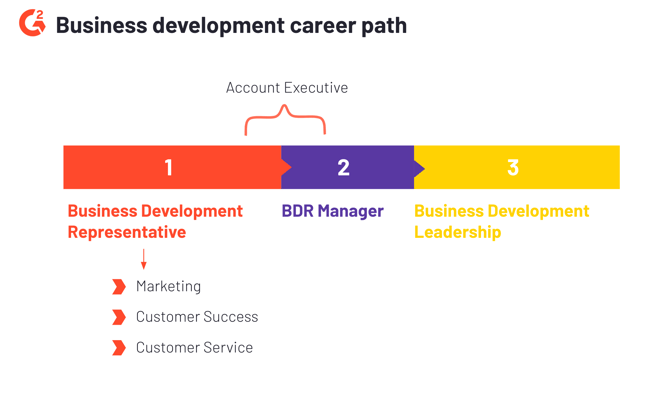April 16, 2019
 by Izabelle Hundrev / April 16, 2019
by Izabelle Hundrev / April 16, 2019

What do you want to be when you grow up?
That age-old question that you’ve been asked since grade school somehow gets more daunting as you grow older. The reality is: a lot of us don’t know what we want to be. And that’s OK.
Part of growing up is learning more about your interests and trying new things to find out which career will be right for you. When you were asked what you wanted to be as a kid, it’s doubtful that your first choice was business development. Most of us are more keen on things like being a space explorer or a princess.
Unfortunately, those job titles aren’t exactly viable. However, if you’re motivated, sharp and interested in working with people, a career in business development might be a fit for you.
A typical career path in business development starts with an entry-level position as a BDR and climbs up the ladder to a manager role, with the possibility of eventually earning a spot in leadership.
In this article, we’ll cover everything you need to know about working in business development. This includes a typical career path, essentials skills and tips for success.
A career in business development is challenging but can also be incredibly rewarding. At most companies, joining the business development team is a great choice for recent college graduates looking to get their foot in the door. Most organizations won’t hire entry-level candidates without past sales experience right into a closing role, so starting off in business development is a great way to get on the path to sales. That being said, sales isn’t the only long-term career path for business development professionals (more on that later).

In short, a business development representative (BDR) is an entry-level position that involves prospecting and qualifying early-stage leads as they enter the funnel. On a day-to-day basis, BDRs are cold calling and emailing prospective buyers in the hope of booking sales appointments.
Joining a company as a BDR is a great way to learn about the business quickly and gain valuable experience interacting with prospective clients. This role often carries a quota, so it’s important to take that into consideration before applying. If you’re comfortable working in a fast-paced environment that is based on metrics, BDR could be a good fit.
As a BDR, you’ll also gain valuable skills to propel you to the next phase of your career, as long as you’re ready. Moving into a closing sales role as an Account Executive or Account Manager is a common next step for most BDRs. However, this isn’t the only path. BDRs often work cross-functionally and gain skills that transfer to positions outside of sales. Common paths include marketing, customer success or even customer service.
If you find yourself thriving in business development, there is also the possibility of moving forward as a team lead or a manager down the line. We’ll touch on this next.
| Tip: Getting ready to interview for a BDR position? Prepare before the big day by reading these common sales interview questions. |
A business development manager is responsible for leading a team of BDRs and owning the beginning of the sales process that involves marketing and sales-qualified leads. This position takes on additional responsibilities of managing individual contributors and overseeing all aspects of sales pipeline.
The right person for this position will have had experience as a BDR in the past to ensure that they’re familiar with the key responsibilities their team will be held accountable for. In some cases, companies will require that a BDR manager has had experience as an Account Executive because this means they have a well-rounded understanding of all aspects of the sales process. Performance metrics for this role are centered around the success of each individual team member and the team’s overall ability to meet their monthly, quarterly and annual sales targets.
If a BDR manager is meeting expectations and able to lead a successful team, there are many opportunities for growth at higher levels of leadership.
Across different companies and industries, there are countless opportunities for strong candidates to be hired on to serve a leadership role within a business development team. The job titles themselves may vary, but common examples include a VP of Business Development or Director of Business Development. These roles are usually filled by people who have been in the BDR manager role before or have strong experience managing a team in a quota carrying position.
As you climb up the ladder, there’s a major shift in responsibility. A person at this point in their career will likely no longer be managing individual contributors and be less caught up in the day-to-day operations of their team. Instead, the focus is on strategic decision-making and tracking company goals at a much higher level.
Whether you’re already in the field or looking to get into business development, it’s no secret that you’ll need a pretty strong set of sales skills to succeed. If you’re worried that you’re not the most talented salesperson, don’t worry just yet. Many of the most successful “biz dev” professionals knew almost nothing about the industry prior to starting. Instead, they committed to learning something new each day and pushing themselves to improve.
The skills you master early on in your business development career are going to shape the rest of your path. Sales skills such as cold calling and objection handling are easily transferable to everything you need to do when you reach the Account Executive level. If you’re not interested in doing sales long-term, that’s OK, too. Luckily, the skills you acquire in business development apply to other areas. For example, time management and active listening are key to job functions such as marketing and customer service.
It’s not always easy to stay motivated at your job. This is especially true for quota-carrying positions that tend to be higher pressure. While pursuing a career in business development may seem daunting because of this, it’s important to form positive habits early on that help you maintain your sales productivity and avoid burnout.
It’s easy to get caught up in the monotony of your daily work life and lose sight of your desired career path – we have all been there. Find ways to remind yourself of your short- and long-term career goals every day. When you pause to look at the bigger picture, it’s easy to see how the not-so-exciting daily tasks are helping propel you forward in your career.
Just because there is a laid out career path for business development, it doesn’t mean you don’t have the power to make that journey your own. If you take time to hone in on your skills and interests, there’s no doubt you’ll make the right choice when deciding if business development is for you. One thing is for sure – the opportunities for growth in this field are endless.
Climbing the corporate ladder is no simple feat. Learn how to ask for a raise so you're prepared to have that conversation when the time comes.
Izabelle is a Partner Marketing Specialist at InStride and a former content specialist at G2. Outside of work, she is passionate about all things pop culture, food, and travel. (she/her/hers)
Navigating your career path can feel a bit like traversing the meandering yellow brick road. ...
 by Courtney Moran
by Courtney Moran
What do you and your career path have in common? You’re both unique!
 by Lauren Pope
by Lauren Pope
The greatest investment you can make isn’t in fancy new technology or high-profile...
 by Lauren Pope
by Lauren Pope
Navigating your career path can feel a bit like traversing the meandering yellow brick road. ...
 by Courtney Moran
by Courtney Moran
What do you and your career path have in common? You’re both unique!
 by Lauren Pope
by Lauren Pope


